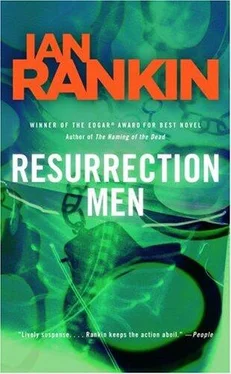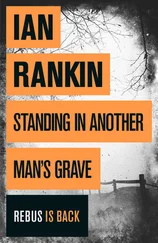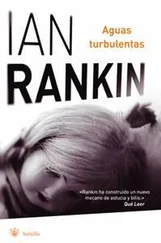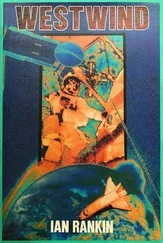Diamond made a gurgling sound. His eyes were protruding from their sockets. Gray kept the pressure up, while Allan Ward burst out laughing, as if this was the most enjoyment he’d had in weeks.
“Let the man answer you, Francis,” Rebus said.
Gray glanced towards Rebus, then released the pressure. Dickie Diamond started coughing, mucus dribbling from his nose.
“That’s repulsive,” Ward said, letting go the hands. Diamond instinctively reached for his own throat, reassuring himself that it was still intact. Then his fingers went to his eyes, wiping away the water that had been squeezed from them.
“Bastards,” he coughed hoarsely. “Stinking bunch of bastards . . .” He got a handkerchief from his pocket, blew his nose. The door had been closed only a couple of minutes, but the place was like a sauna. Stu Sutherland opened it again, letting some air in. Gray, still behind Diamond, had straightened up, and was standing with an arm on each of the seated man’s shoulders.
“Easier all round if you just start talking,” Jazz said quietly: suddenly playing sympathetic cop to Gray’s monster.
“All right, all right . . . somebody get me a can of juice or something.”
“ After we’ve listened to your story,” Gray insisted.
“Look . . .” Diamond tried meeting their eyes, lingering longest on Rebus. “All I know is what was being said at the time.”
“And what was that?” Jazz asked.
“Chib Kelly. . .” Diamond paused. “You were right about him. He was after Fenella. She found out about Rico playing away from home and told Chib. Next thing, Rico’s dead . . . simple as that.”
Gray and Jazz shared a glance, and Rebus knew what they were thinking. Dickie Diamond was telling them what he thought they wanted to hear, what he thought they’d believe. He’d taken the information they’d gifted him, and he was running with it. He’d even lifted Jazz’s own phrasing: playing away from home.
Gray and Jazz weren’t falling for it. The others in the room looked more excited.
“Knew it all along,” Stu Sutherland muttered. Tam Barclay was nodding, and Allan Ward seemed entranced.
Gray’s eyes sought Rebus’s, but Rebus wasn’t playing. He stared down at his shoes while Diamond embroidered the story further.
“Chib knew about the caravan . . . that’s where Rico would take all his women. It was Chib had it torched — he’d have done anything to win over Fenella . . .”
Rebus could see that Gray was beginning to apply pressure to Diamond’s shoulders.
“Th-that’s about all I can tell you. Nobody crossed Chib Kelly . . . why I had to do a runner . . .” Diamond’s face was creasing with pain as Gray’s fingers did their work.
“Is this a private party, or can anyone join in?” The voice belonged to Archie Tennant. Relief flooded Rebus’s veins as Gray let go of Diamond. Barclay and Sutherland started talking at once, filling Tennant in.
“Whoa, whoa . . . one at a time,” Tennant ordered, holding up a hand. Then he listened to the story, the others chipping in when a bit was missed. All the time, Tennant was studying the seated figure, Diamond staring back, aware that he was in the presence of someone important, someone who could get him out of this place.
When the story was finished, Tennant leaned down with clenched fists on the desk, his knuckles bearing his weight. “Is that a fair summary, Mr. Diamond?” he asked. Diamond nodded vigorously. “And you’d be willing to make a statement to that effect?”
“With respect, sir,” Jazz McCullough interrupted, “I’m not so sure we’re not being led up the garden path here . . .”
Tennant stood up, turned his gaze on Jazz. “And what makes you say that?”
“Just a feeling, sir. I don’t think I’m the only one.”
“Really?” Tennant looked around the room. “Anyone else find Mr. Diamond’s story less than tenable?”
“I have a few doubts myself, sir,” Francis Gray piped up. Tennant nodded, his eyes seeming to home in on Rebus.
“And yourself, DI Rebus?”
“I found the witness credible, sir,” he said, the words sounding as stiff to him as to anyone else in the room.
“With respect, sir . . .” Jazz repeating the gambit. “Taking a statement from Mr. Diamond is one thing, but letting him walk out afterwards probably means we’re not going to see him again.”
Tennant turned to Diamond. “DI McCullough isn’t sure he trusts you, sir. What do you have to say to that?”
“You can’t keep me here.”
Tennant nodded. “He’s got a point there, DI McCullough. I’m assuming Mr. Diamond would be willing to give us his address in the city?” Diamond nodded with enthusiasm. “And a permanent address also?” The nodding continued.
“Sir, he could make up any number of addresses,” Jazz continued to protest.
“Oh ye of little faith,” Tennant commented. “Let’s start with a statement anyway . . .” He paused. “Always supposing that’s okay with you, DI McCullough.”
Jazz said nothing — precisely what was expected of him.
“Here endeth the lesson,” Tennant intoned, pressing the palms of his hands together as if in prayer.
Barclay and Sutherland took Diamond’s statement, the others vacating IR1, leaving them to get on with it. Tennant motioned to Jazz that he wanted a word with him in private, the two of them heading towards the station’s reception area. Allan Ward said he was heading out back for a smoke. Rebus declined to join him, went to the drinks machine instead.
“He did a good job of protecting you,” Francis Gray said. He was already at the machine, awaiting delivery of his coffee.
“I thought so,” Rebus admitted.
“I don’t think anyone else noticed that the two of you knew one another better than you should.” Rebus didn’t say anything. “But you weren’t exactly surprised to see him, were you? Did he warn you he was in town?”
“No comment.”
“We found him at the Bar Z. Probably means his nephew keeps in touch. Dickie knew we were after him, and came sneaking back . . . Did he speak to you last night?”
“I didn’t know I was working with Sherlock fucking Holmes.”
Gray chuckled, shoulders shaking as he leaned down to remove the cup from the machine. Rebus was reminded of the way the man had leaned down over Dickie Diamond, threatening to smother him completely.
Jazz was walking up the corridor. He made a show of rubbing his backside, as though the headmaster had just caned him.
“What did Half-Pint want?” Gray asked.
“Twittering on about how it’s okay to argue your corner against a senior officer, but you have to know when to back off and not start taking it personally.”
Rebus was thinking: Half-Pint. Gray and Jazz had found their own private nickname for Tennant. They were close, these two . . .
“I was just telling John,” Gray went on, “about Dickie’s wee acting lesson back there.”
Jazz nodded, eyes on Rebus. “He didn’t give you away,” he agreed.
So Gray had told Jazz all about Rebus’s confession . . . Were there any secrets between the two men?
“Don’t worry,” Gray assured him, “you can trust Jazz.”
“He’s going to have to,” Jazz himself added, “if we’re going to pull off this wee plan of his.”
The silence lay between them until Rebus could find his voice.
“You’re up for it then?”
“Could be,” Gray said.
“Need to know a bit more first,” Jazz qualified. “Layout, all that stuff. No point being unprofessional, is there?”
“Absolutely not,” Gray concurred.
“Right,” Rebus said, his mouth suddenly dry. It was my calling card, that’s all. There is no “wee plan” . . . is there?
Читать дальше












